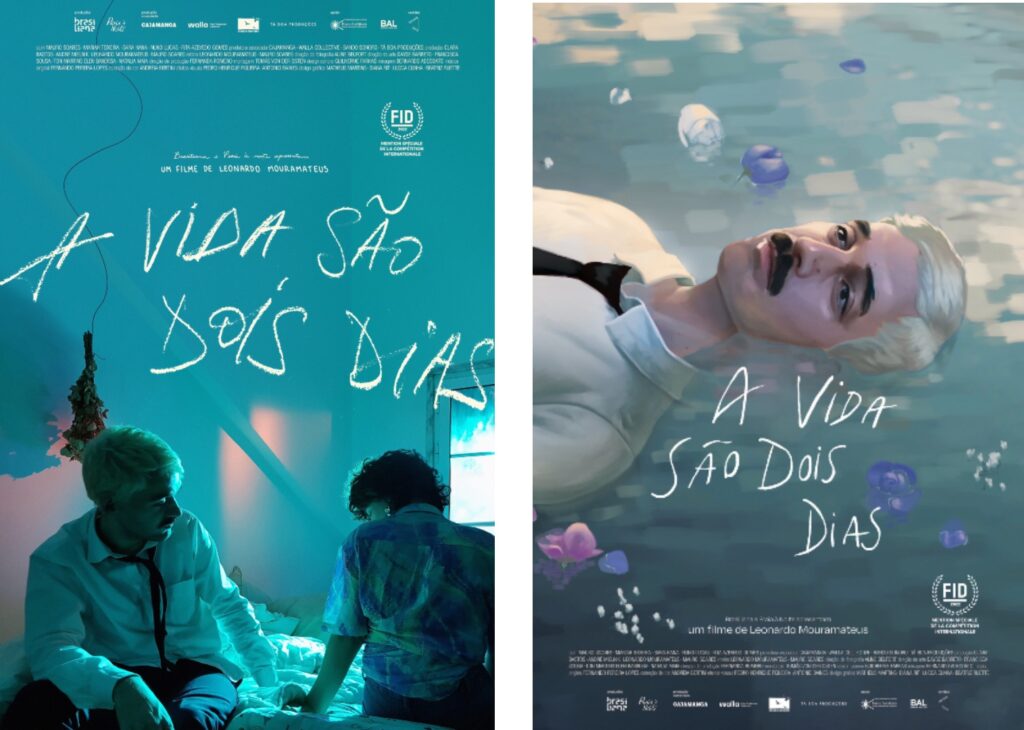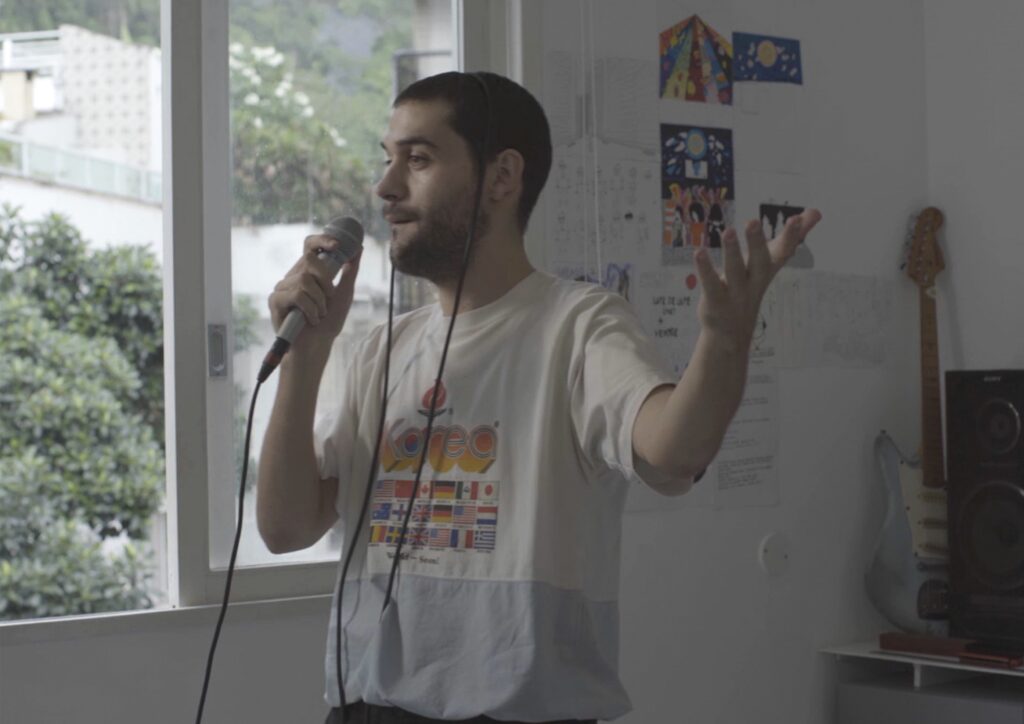Brothers in Alienation
Only a fool would still believe that modern Western society’s many absurd contradictions are anomalies, rather than features of its organising systems. More “global” and connected than ever, we are also the loneliest we’ve ever been. Science has progressed in leaps and bounds, yet the gap between the haves and the have-nots is growing. Individuals have endless choices as free capitalist agents, but their freedoms as citizens are increasingly limited. Information is more accessible than at any other point in history, yet we seem to know and understand less and less. Dig a little deeper and you soon realise that these apparent contradictions are not contradictions at all: they are codependent facts. Knowing this, however, only makes day-to-day living marginally more bearable. In a world that only makes sense on a large scale and is often discombobulating on a human level, can narrative cinema still speak to reality?

Leonardo Mouramateus’s Life Lasts Two Days is a playful film that, at first, seems to toy with the many tropes, motifs and expectations of cinema for the sake of pleasure alone. It delights in the interaction between image and voiceover, in the potential for surprise at the turn of a cut, in the sheer beauty of a careful composition, in bodies dancing and the aural joy of music. But on closer look, this elasticity also appears to be born out of a clear perception of our current reality — a vision stripped of the reassuring but hypocritical narratives many still employ to describe our world. The film opens on Rómulo (Mauro Soares), a young Portuguese man who explains in voiceover that he has been living in Rio de Janeiro for several years and is finally starting to feel happy about his life, even as he describes it in less than glowing terms. He has a kitchen job, lives in a barebones flat with a roommate he does not always get along with, and is very uncertain about the status of his relationship with his sort-of girlfriend (Sara Hana). The feeling is one of fragile contentment and lowered expectations, and Rómulo calls himself the conductor of a “symphony of banalities.” It’s a point of view echoed in the film’s unadorned, simple cinematography, the camera moving slowly as though great concentration was required not to veer off in all directions. It’s also heard in the strange, new age-y lyrics Rómulo sings with his friends in the opening scene, a poetic mix of pointless everyday observations and extremely dramatic, romantic lines. When living so close to the ground, the difference between high and low becomes essentially irrelevant; the lyrical can be — has to be — found among the trash. It only makes sense, then, that upon hearing his rickety second-hand motorbike loudly run over and crushed by a car outside his window, Rómulo initially believes the screeching sound to be part of the song’s musical arrangement.
“When living so close to the ground, the difference between high and low becomes essentially irrelevant; the lyrical can be — has to be — found among the trash.”
In this upside-down world we call modernity, another levelling of sorts can be observed between the rich and the poor: differences in means do not indicate anything more than differences in luck, which is famously fickle. The barrier between the upper and lower classes — an injustice once at the heart of so many epic stories and bildungsromans — is no longer truly insurmountable, but merely a pretence that only holds up if all parties believe in it. Rómulo and his girlfriend easily cross it when they find the person who destroyed the motorcycle. Following oil marks, they end up in front of the perpetrator’s home, a building that is obviously reserved for the wealthy. They manage to get inside despite the doorman and the security gate when the very distracted criminal, a rich and famous actress (Mariah Teixeira), mistakes them for a friend.
This is the first of many instances where the film plays with the concept of identity and doubles, a familiar trope from cinema that is always entertaining but which here also falls in line with the film’s concern with the ephemeral, uncertain, fragmented and fluid quality of modern day experience. In a world where people have to pick up random, often temporary jobs just to survive, the questions of what someone chooses to do and who they choose to be call for very complex answers. In that context, how different can any two people really be from one another — whether they live in Brazil or Portugal, are rich or poor, employed or out of a job?

The question comes into sharp focus with the introduction of Rómulo’s twin brother, Orlando. Rómulo mentions him early on, explaining that they do not get along, which makes the moment he finally appears particularly thrilling — also because actor Mauro Soares, who plays both brothers, brilliantly conveys two very different personalities. Orlando, who lives in Lisbon, Portugal, is a much more firm and decisive person than his brother, and makes a comfortable living as an unscrupulous and shrewd bookseller. Watching him negotiate a sale with a girl called Miriam (also played by Mariah Teixeira), it quickly becomes clear that, unlike his brother, Orlando has mastered the workings of modern-day capitalism, fully absorbed its cruelty and turned it to his advantage. In one of his earliest scenes, we see him opening mail from his brother and stopping mid-sentence while reading the note. He then begins reading the manuscript written by Rómulo that is also in the envelope, but then abandons it on a bench without looking back. Orlando isn’t just different from his brother, he is also contemptuous of his lifestyle: “He’s the type of person who approaches you only when he’s in trouble,” he tells Miriam. Yet it’s not clear when, if ever, Orlando approaches his brother.

The manuscript, as you may have guessed, begins precisely like the film itself, with Rómulo speaking in voiceover: “It all started when I got sick…” Is what follows ‘real life,’ or the continuation of Rómulo’s novel? Either way, the novel is what triggers what comes next; in both cases, a piece of art provokes a coming together of opposites — or more precisely, the revelation that each contains the other. Orlando comes to Brazil to help with the promotion of Rómulo’s now published novel, while the latter lays unconscious in a hotel room, his medical bills paid for by his publisher. In a way, Orlando finds himself in Rómulo’s world, meeting the people in his brother’s life who seem to know the sick man better than his own twin. But Orlando continues to behave in ways that are entirely opposite to his brother: he is dismissive, rude, passive aggressive with practically everyone he sees. When Rómulo’s now ex-girlfriend confronts him about accepting an award on behalf of his brother from people who do not understand the book, Orlando sticks to his guns: this is what he came to Brazil to do. Winning awards, being successful, having your expenses paid for by others — this is what Orlando sees as winning: “I learned early on how things could serve me,” he confesses at some point.
“Are the twins merely reflections of one another, equals but also opposites?”
But the more time he spends there, the more he comes to reflect on the ways his own personality is simply a response to that of his sibling. It isn’t hard to interpret Orlando’s efforts to keep his brother at arm’s length, refusing to read his letters and generally dismissing him, as attempts to be independent from him. But by Orlando’s own admission, even this is just a reaction, one of the many ways he defines himself in relation to a brother he rarely sees. Are the twins merely reflections of one another, equals but also opposites? Can Orlando ever step outside of this reactive behaviour, and finally act of his own accord? In Brazil, cut off from his independent life in Portugal, thrown into that of his almost estranged twin brother, Orlando confronts the origins of his values. “He would always quit games,” he says, thinking back to their childhood. “That’s why I won.” Is the rat race he’s engaged in just to spite his brother really worth it? Through Orlando’s journey, we too can glimpse a way out of the competitive hall of mirrors that is modern life, and a sympathetic artist looking back at us.
Elena Lazic is a French freelance film writer based in London, UK, with bylines in Cineuropa, Sight & Sound and Little White Lies among other outlets. She is also the founder and editor of Animus Magazine.